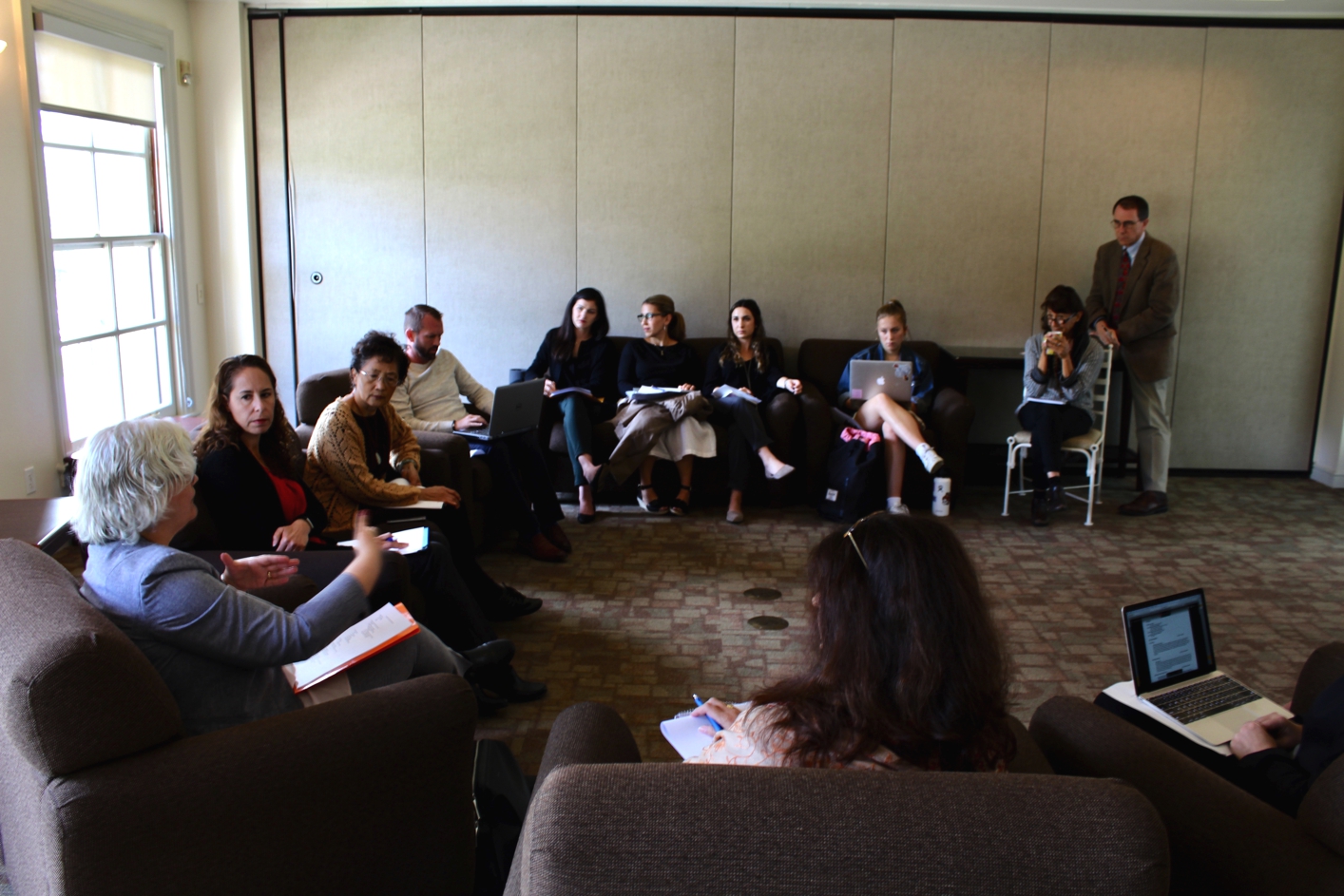
Three candidates for the Title IX coordinator position* visited campus Nov. 13–15 for final interviews and open-campus community forums, the latest step in a nationwide search process that began with former Title IX Coordinator Ruth Jones’ resignation in 2017. The search began with the formation of a search committee, announced in an email sent to the Occidental community Sept. 21 by President Jonathan Veitch. According to committee co-chair and Diplomacy and World Affairs Professor Laura Hebert, committee members have been working to identify finalists and provide feedback to Veitch, who makes the final hiring decision.
According to Marianne Frapwell, committee member and Project S.A.F.E. (for a Sexual Assault Free Environment) program manager and survivor advocate, the on-campus interviews took place in order to give community stakeholders an opportunity to meet and ask questions of the candidate finalists. Frapwell said the visits also gave the candidates an opportunity to get to know the campus and community more intimately. The on-campus interviews were day-long processes for each candidate that involved interviews with Veitch and the committee, as well as attending the open-campus community forums, according to Frapwell.
The committee hosted the forums in the Johnson Student Center (JSC) Morrison Lounge and allowed candidates to introduce themselves and their background before the opportunity for questions from attendees. Chief of Administrative Affairs Marsha Schnirring sent out email invitations to the Occidental community before each forum.
Candidate No. 1 visited Nov. 13, and had an extensive background in Title IX work, with strong beliefs in the restorative justice process. They were attracted to the small community that Occidental offered — they noted the intimacy of Occidental as both a strength and a weakness of the college, providing new reasons for collaboration and communication.
“[Occidental’s] greatest challenge is its greatest strength,” candidate No. 1 said.
Candidate No. 2 visited Nov. 14 and was also attracted by the small number of students at Occidental, with prior experience working in similarly close-knit environments. They noted the importance of working in partnerships across campus — with Greek life, the LGBTQ community and international students.
“We are protecting students because it is our duty, even in spite of laws,” candidate No. 2 said.
Candidate No. 3 visited Nov. 15 and had a history working on federal discrimination investigations. They attributed much of their past job experience to working on equity from the outside. According to candidate No. 3, the prospect of the position at Occidental excites them because it would allow them to work within the Title IX system.
“Be afraid to die until you’ve won some victory for humanity,” candidate No. 3 said.
Hebert said the committee is not allowed to rank finalists. Their role instead is to provide feedback from the community and the committee to the hiring manager. According to Hebert, Veitch will extend the final offer of employment. Veitch is the hiring manager because all positions on the senior leadership team — including the Title IX coordinator — report to the president of the college.
In Veitch’s campus-wide email Sept. 21, he identified November as the time when finalists would visit campus and participate in on-campus interviews. Besides this expectation, there was no strict timeline for the search, according to committee co-chair and Assistant Dean of Students Tamara Himmelstein.
“We’re not going to force it or make an offer because we feel like we have this deadline looming,” Himmelstein said.
According to Himmelstein, instead of focusing on finding the right candidate by a specific date, the committee is focused on finding the best person for the job.
Frapwell said the committee now hopes to have a new coordinator in place by the Spring 2018 semester; the date is partially dependent on the successful candidate’s relocation needs and timeline.
After receiving applications from the Human Resources office, the committee conducted phone and video interviews and narrowed down the list of candidates to three, who were invited to the on-campus interviews, according to Frapwell.
Hebert said that, as a faculty member, she was looking for a candidate who prioritized the students’ education.
“We are really focused on whether our students are able to get the most out of their education that they possibly can and not be distracted by discrimination and marginalization,” Hebert said. “That for me has to be a priority, and not necessarily the image or reputation of the college.”
The committee looked for candidates that had experience with Title IX legislation, higher education and trauma-informed care, according to Himmelstein.
“It’s important that [Occidental’s] Title IX Coordinator has a distinct commitment to ending and providing remedy for gender and sex-based discrimination, and doesn’t think of Title IX as just a compliance issue,” Frapwell said.

Micaela Stevens (senior), a student representative on the search committee, said that she wanted a coordinator who would be comfortable pushing back against the administration if needed.
“Honestly, given [Occidental’s] really dark history in terms of our Title IX Office before Ruth Jones came in, I’m looking for someone I trust to continue working on it and making it better,” Stevens said.
Accessibility was also a top priority among committee members, according to Hebert. She said that although knowledge and work experience is important, students from diverse backgrounds need to feel comfortable reaching out and engaging with the coordinator.
“This is a campus where our Title IX coordinator really needs to be responsive to students and faculty — students primarily,” Hebert said. “[We want] someone who is paying attention to the entire campus body, but really students in particular who tend to be marginalized and overlooked.”
The committee was originally composed of seven members until Himmelstein announced via email Oct. 22 that two new members would join. Himmelstein said that the committee received suggestions to increase the small size of the committee through online feedback platforms available during the beginning of the semester. The committee added Stevens based on recommendations from DEB and Politics Professor Edward Kammerer based on recommendations from the faculty council, according to Himmelstein.
“In response to community feedback received, the search committee has expanded to include an additional faculty member and an additional student representative,” Himmelstein said via email.

According to Hebert, the committee also identified a lack of racial diversity on the committee as a central concern early on. She said that since members of the Occidental community have many responsibilities already, the committee was not able to add faculty or students of color onto the committee.
“That’s one thing I think the entire committee would say they wish we would have had,” Hebert said. “I think it motivated us more to make sure that we were doing the kind of outreach to get feedback.”
In the days following the on-campus visits, the committee invited the Occidental community to provide online feedback, while Veitch will continue reviewing feedback to determine the next steps for the process, Himmelstein said.
According to Himmelstein, until the permanent position is filled, Interim Title IX Coordinator Danica Meyers will continue in her position. Occidental’s on-campus confidential resources remain in place and can be found on the Title IX website.
*The Occidental Weekly has kept the Title IX coordinator candidates’ identities anonymous to protect the candidates’ job security.
![]()































